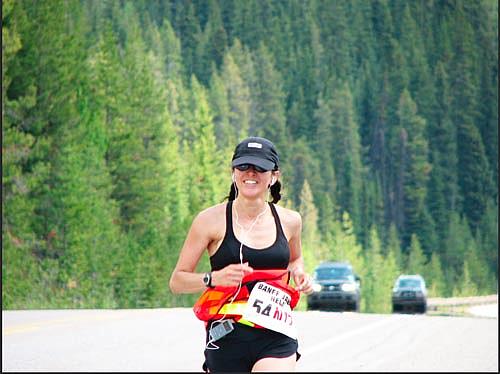She ‘Runs’ In Fight to End Human Trafficking
A native of Mexico who now lives in Canada, Bastidas currently holds the Guinness World Record for the longest and fastest triathlon completed by a woman: 3,762 miles in 65 days.

Norma Bastidas started running out of desperation.
She needed to escape the pain caused by years of abuse as a child and later as the victim of human trafficking.
“I wanted to run and never stop,” Bastidas told the women taking part in last week’s “Café Con…” (Coffee with), a speaker series hosted by the East Los Angeles Women’s Center (ELAWC) focused on women’s issues. She’d been invited to discuss her experience both as a victim and a survivor in observance of Human Trafficking Awareness Month.
Lea este artículo en Español: Ella ‘Corre’ para Terminar la Trata Ilegal de Personas
A native of Mexico who now lives in Canada, Bastidas currently holds the Guinness World Record for the longest and fastest triathlon completed by a woman: 3,762 miles in 65 days.
Running triathlons was not her original goal, she said, explaining it wasn’t until she was about 38-years-old that she discovered she really enjoys what started out as a way to deal with “sleeping problems.”
Bastidas recounted for the group her experience growing up in a single parent home and the abuse she suffered as a child. She talked about how at age 19 she left her country to Japan to work as a model and hostess in a restaurant bar, but the promise of paid travel and accommodations were just a ploy to turn her into an escort. She told the women gathered that her abusers took away her visa and forced her to work for them for nine months to pay off those travel and living expenses.
Nonetheless, after regaining her freedom, Bastidas decided to stay in Japan to pursue her studies on a student visa. “I mastered Japanese and worked as a translator and model,” Bastidas told EGP. But the sexual abuse continued, she said, telling how police refused to help her when she was sexually assaulted twice on the streets of Japan because she was a foreigner and had once worked in a bar.
“The last time I was assaulted they almost killed me,” Bastidas recalled in a broken voice.
“I was afraid to speak about it because I was told my whole life that I was to blame if someone abused or raped me.”
Bastidas story is not unique. A recent study by the National Institute of Justice—an International Labor Organization—found that human trafficking, which includes commercialized sexual exploitation, forced labor, and domestic servitude, denies freedom to some 20 million people around the world, fifty-five percent of them women, and twenty-six percent children.
According to a 2014 Human Trafficking Assessment study conducted by the East L.A. Women’s Center, human trafficking, with the purpose of engaging in sexual acts for monetary gain has become a significant public health problem and human rights issue in Southern California, more specifically, in the city of Los Angeles.
The assessment states that the risks from women and girls trafficked for the sex trade includes “unprotected sex, physical trauma and multiple sex partners often heighten the transmission and spread of HIV and other sexually transmitted diseases.”
To fight human trafficking in Los Angeles, the organization offers support programs for victims and youth at risk. They work to create awareness about HIV/AIDS among Latinas by distributing information in strip clubs and bars, and by addressing the issue in public with speakers like Bastidas.
People assume human trafficking is an isolated tragic event that happens somewhere far away, Bastidas told EGP. In reality, it’s everywhere, affecting a large number of people, she said.
That’s why she decided to publicly identify herself as a human trafficking survivor: to change perceptions about the victims.
Bastidas has run thousands of miles advocating for the fight to end human trafficking. She also finished the famous 777 Run for Sight—seven-ultra marathons in seven continents in seven months—to fundraise for the blind and visually impaired in honor of her 22-year old son who in 2006 was diagnosed with an incurable disease that could make him go blind.
She runs for good causes, and those good causes have helped her heal, she says.
Her words are very “motivating,” ELAWC Board Chair Mercedes Y. Perez told EGP.
It’s the same sentiment shared by Brad Riley, founder and president of iEmpathize, a nonprofit group fighting crimes against children and a supporter of Bastidas’
Guinness World Record triathlon attempt. People should ask themselves, “If Norma [Bastidas] can swim, bike and run 3,762 miles to fight human trafficking, ‘what can I do?’ he wrote on the group’s website.
“For so long it seemed impossible that I would ever break the cycle of abuse in my life,” Bastidas told EGP. “But I continued to ask for help and found a way.”
“We need to be the voices behind this issue.”
For more information about Norma Bastidas visit: www.normabastidas.com
To know more about human trafficking programs visit East Los Angeles Women Center
—-
Twitter @jackiereporter

